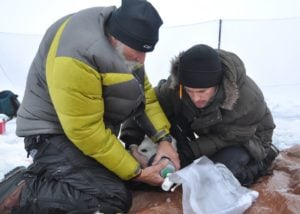The Anchorage Daily News has an interesting story on polar bear research in the Arctic. This fall, scientists from the University of Alaska Fairbanks on board the US Coast Guard Cutter Polar Sea, one of the world’s most powerful icebreakers, researched how melting sea ice is affecting polar bears. These animals rely on sea ice as hunting platforms. Though they are powerful swimmers, polar bears cannot swim for long stretches without recuperating on a sturdy, floating piece of ice. As the ice cap recedes, however, the bears are finding it harder and harder to hunt seals, which constitute their main diet. As top predators in the Arctic food chain, declining polar bear populations will have an effect on the rest of the food web, which is exactly what the researchers were studying.

In the winter, most of the Arctic Sea freezes over, which makes it easy for polar bears to hunt. Yet during the summer – particularly this past summer, when the ice pack only began 200 miles away from the north coast of Alaska – polar bears must decide to either stay on land or on the ice pack. However, if the bears remain on the pack, there aren’t too many seals 200 miles from shore, where the waters are less dense in nutrients, so they can starve.

Scientists had collared 11 polar bears in the spring for study, but due to thin, fragile ice, conditions allowed them to only recapture four. Thus, melting ice is ironically affecting science as well. Researchers were able to dive underwater to study the animal life in the frigid waters of the Arctic. You can view some photos from the dives here, on the ADN’s website. Data from the study is still being analyzed with the help of researchers from the University of Wyoming and the U.S. Fish & Wildlife Service, so it will be a while before any results are published.
For more information, the Coast Guard also put up a website with journal entries, photographs, and biographies of scientists on board the ship.
like it!